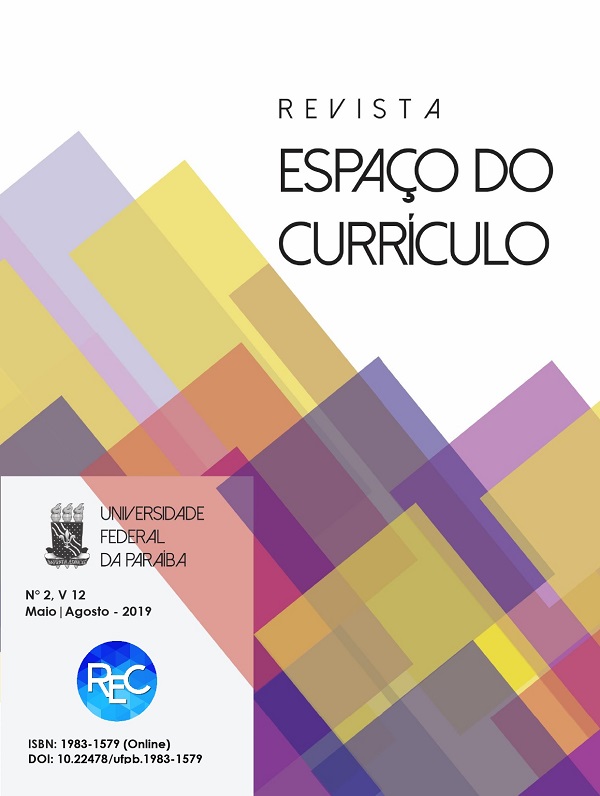CURRICULAR AUTONOMY OF THE TEACHER IN ANGOLA
a look from the perspective of normative documents
DOI:
https://doi.org/10.22478/ufpb.1983-1579.2019v12n2.43145Keywords:
curriculum., Teacher Autonomy., quality of education.Abstract
Overview Angola crosses moments of profound changes to all fields and dimensions, which makes sense to rethink the school, as a strategic location from curricular decision, organizational change and functional that allow to improve the teaching and adapting the system educational requirements today. Inserted in this logic to the publication of the Presidential Decree No. 160/18 of July 3, though tacit, seeks to generate a new perspective of curricular management allowing some margin of autonomy to teachers, while curricular agents, reinforcing your role. So, still seems to be some dissonance between the conditions laid down in the standard and what happens on the ground of the practices. In this sense, the present article augurs analyzecurricular teacher autonomy in light ofthe Executive Decree above mentioned, in order to ensure the educational success of learners. To support the same, and based on a qualitative approach, excelled by lifting the bibliographical and documental analysis apparatus. To elaborate the text banterback and forth with Ratti (1998, 2013); Pacheco(2000, 2001); Morgado (2000;2011); Afono (2014), and others that discuss the curriculum of teacher autonomy. The currentstandard, albeit tacit, gives autonomy to teachers, however, daily observations and reports indicate some ignorance of this prerogative rules, because in many cases, some teachers favor exactly what the curriculum at the expense ofshared decision making, putting into question the quality of the teaching and learning process.
Downloads
Metrics
References
AFONSO, Augusto. O papel do professor na (Re)Construção do Currículo do 1º Ciclo do Ensino Secundário em Angola: das intenções às práticas. Capítulo III da Tese de Doutoramento. Braga: Instituto de Educação e Psicologia da Universidade do Minho, 2004.
ANGOLA - Lei de Bases do Sistema Educativo Angoano. Lei de Base do Sistema de Educação e Ensino Nº 17/16 de 7 de Outubro. Angola, 2016.
CANÁRIO, Rui. A escola tem futuro? Das promessas às incertezas. Porto Alegre: Artmed, 2006.
COUTINHO, Carlos. Paradigmas, Metodologias e Métodos de Investigação. Lisboa: Almedina, 2011.
DLP. Dicionário da Língua Portuguesa. Porto: Porto Editora, 2011.
FIGUEIREDO, Carla; LEITE, Carlinda & FERNANDES, Preciosa. O desenvolvimento do currículo no contexto de uma avaliação de escolas centrada nos resultados: que implicações? Currículo sem Fronteiras, v. 16, n. 3, p. 646-664, set./dez. 2016.
GIL, António. Métodos e Técnicas de Pesquisa Social. 6ª Edição. São Paulo: Atlas , 2008.
LEITE, Carlinda. Para uma escola Curricularmente inteligente. Porto: Edições Asa, 2003.
MARCONI, Andrade; LAKATOS, Eva. Fundamentos de Metodologia Científica. 5ª ed. São Paulo: Editora Atlas S.A, 2003.
MORGADO, José . A (des)construção da autonomia curricular. Lisboa: Edições ASA, 2000.
MACHADO, Manuel. O Papel do Professor na Construção do Currículo. Dissertação apresentada para obtenção do grau de Mestre em Ciências da Educação. Braga: Instituto de Educação e Psicologia da Universidade do Minho, 2006.
PACHECO, José. Currículo: teoria e práxis. Porto: Porto Editora, 2001.
PACHECO, José. Tendências de descentralização das políticas curriculares. In José Augusto Pacheco (Org.), Políticas Educativas. O Neoliberalismo em Educação. Porto: Porto Editora, pp. 91-107, 2001.
Downloads
Published
How to Cite
Issue
Section
License
By submitting an article to Curriculum Space Journal (CSJ) and having it approved, the authors agree to assign, without remuneration, the following rights to Curriculum Space Journal: first publication rights and permission for CSJ to redistribute this article. article and its metadata to the indexing and reference services that its editors deem appropriate.
















